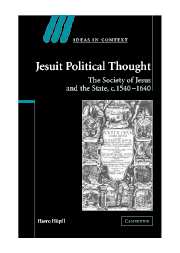Book contents
- Front Matter
- Contents
- Acknowledgements
- List of abbreviations
- Translations, references, and orthography
- Introduction
- 1 The character of the Society of Jesus
- 2 The Society's organisational ideas
- 3 The Society and political matters
- 4 The Church, the Society, and heresy
- 5 The confrontation with reason of state
- 6 Reason of state and religious uniformity
- 7 Jesuit reason of state and fides
- 8 Reason of state, prudence, and the academic curriculum
- 9 The theory of political authority
- 10 Limited government, compacts, and states of nature
- 11 The theory of law
- 12 The common good and individual rights
- 13 Tyrannicide, the Oath of Allegiance controversy, and the assassination of Henri IV
- 14 The papal potestas indirecta
- Conclusion
- Bibliography
- Index
- IDEAS IN CONTEXT
6 - Reason of state and religious uniformity
Published online by Cambridge University Press: 22 September 2009
- Front Matter
- Contents
- Acknowledgements
- List of abbreviations
- Translations, references, and orthography
- Introduction
- 1 The character of the Society of Jesus
- 2 The Society's organisational ideas
- 3 The Society and political matters
- 4 The Church, the Society, and heresy
- 5 The confrontation with reason of state
- 6 Reason of state and religious uniformity
- 7 Jesuit reason of state and fides
- 8 Reason of state, prudence, and the academic curriculum
- 9 The theory of political authority
- 10 Limited government, compacts, and states of nature
- 11 The theory of law
- 12 The common good and individual rights
- 13 Tyrannicide, the Oath of Allegiance controversy, and the assassination of Henri IV
- 14 The papal potestas indirecta
- Conclusion
- Bibliography
- Index
- IDEAS IN CONTEXT
Summary
THE POLITICAL UTILITY OF INTOLERANCE
The decisive argument to persuade princes to enforce Catholic orthodoxy was that heresy endangered the ‘state’. The argument was intended to stiffen the resolve of rulers sufficiently intimidated by the difficulties involved in attempting to restore religious uniformity by force to listen to the seductive advocates of toleration. For the Society itself, the welfare of the Church and of endangered souls was justification enough for the enforcement of religious uniformity. Ignatius had mentioned no other consideration in his seminal letters to Canisius, and extra-spiritual concerns were still only an afterthought for Bellarmine decades later. Possevino in his ultra-orthodox Verdict normally regarded his work as done when politiques, heretics, and Machiavellians had been shown up as doctrinally deplorable.
Jesuits were not alone in regarding the political dangers of heresy as the clinching argument against toleration; even Lipsius found it persuasive. The case for intolerance that Jesuits produced was impeccably ‘reason of state’. Some of them even enlisted Machiavelli himself. The same argument, mutatis mutandis, appears in Bellarmine's De Laicis, Botero's Della ragion di stato, Possevino's Iudicium, Bibliotheca selecta, Ribadeneira's Tratado/Princeps Christianus, Robert Persons's Conference, Juan Mariana's De rege et regis institutione, Thomas Fitzherbert's An sit utilitas in scelere, and his First and Second part of a Treatise concerning Policy and Religion, Becanus's Manuale and De fide haereticis servanda, Scribani's Politicus Christianus, Adam Contzen's Politicorum libri decem, and other such works.
- Type
- Chapter
- Information
- Jesuit Political ThoughtThe Society of Jesus and the State, c.1540–1630, pp. 112 - 139Publisher: Cambridge University PressPrint publication year: 2004



